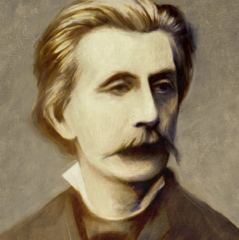Composer, pianist and conductor, born in Wrocław, died in Paris. Moszkowski’s family moved to Dresden in 1865 and he enrolled at the local Conservatory. Having moved to Berlin in 1869, he first studied piano under Eduard Frank and composition under Friedrich Kiel at the Stein Conservatory and then piano under Theodore Kullak at his Neue Akademie der Tonkunst. He started teaching at the Akademie at the age of seventeen, and in 1872 took a piano class which he was to run for the following twenty-five years.
Maurycy Moszkowski’s career as a pianist began when he was nineteen, with a concert in Berlin in the presence of Franz Liszt. More concerts followed in Berlin, Vienna, Paris, London and Warsaw, the repertoire consisting chiefly of classical and romantic music and including a lot of Frederick Chopin as well as Moszkowski’s own compositions. Warsaw first heard his symphonic poem Jeanne d’Arc op. 19 in July 1880.
In the second half of the 1880s his ailing health made him discontinue giving piano concerts and devote himself to composing and conducting. He promoted music by Ludwig van Beethoven, Richard Wagner and Spanish composers (he had a special affection for Spanish music) as well as his own works. In 1889 he conducted an introduction and ballet music for his opera Boabdil, der letzte Maurenkönig op. 49 in a Warsaw concert whose proceeds helped to construct the building of the Warsaw Music Society. In February 1890 he conducted his Violin concerto in C major op. 30 and Suite in G minor op. 39 for orchestra at the Warsaw Teatr Wielki, followed by a concert in Vienna on the occasion of the Universal Exhibition in 1892. In 1893 he was made (with the painter Julian Fałat) member of the Academy of Fine Arts in Berlin. He settled in Paris in 1897 and was made member of the French Academy of Fine Arts in 1899. He took part – with Edvard Grieg – in the ceremony of unveiling Richard Wagner’s monument in London in 1903.
The progressing illness put an end to Moszkowski’s career, and World War I made him broke as he had invested significant amounts of money into German, Polish and Russian bonds. A concert was held in New York’s Carnegie Hall in 1921 with fifteen of the world’s finest pianists performing to offer him emotional and material support.
Sources: www.culture.pl, Małgorzata Kosińska, Polish Music Information Center, October 2006.
-
2 Konzertstücke for violin and piano, Op. 16 Download 3 Nouvelles Danses Espagnoles for piano four-hands, Op. 65 Download 3 Stücke for cello and piano, Op. 29 Download 4 Morceaux for violin and piano, Op. 82 Download 4 Polish Folk Dances for piano four-hands, Op. 55 Download 4 Vierhändige Klavierstücke, Op. 33 Download 5 Spanish Danses for piano four-hands, Op. 12 Download Album espagnol for piano four-hands, Op. 21 Download Aus aller Herren Länder for piano four-hands, Op. 23 Download Caprice for two pianos, Op. 31b Buy Cortege et Gavotte for piano four-hands, Op. 43 Download Deutsche Reigen for piano four-hands, Op. 25 Download Etude for two pianos Buy Kaleidoscop for piano four-hands, Op. 74 Download Piano concerto in E major for 2 pianos, Op. 59 Download Le maître et l'élève for piano four-hands, Op. 96 Download Mazurka in D major for two pianos Buy Mazurka in F major for two pianos Buy Passepied for violin and piano, Op. 56c Buy Scherzetto Op. 31a for two pianos Buy Suite for 2 violins and piano, Op. 71 Download
-
10 Petits morceaux, Op. 94 Download 10 Piéces mignonnes, Op. 77 Download 12 Etudes for the Left Hand, Op. 92 Download 15 Etudes de Virtuosité, Op. 72 Download 2 Concert Etudes, Op. 48 Download 2 Morceaux, Op. 67 Download 2 Morceaux, Op. 70 Download 2 Morceaux, Op. 75 Download 2 Morceaux, Op. 80 Download 2 Piano Pieces, Op. 27 Download 2 Piano Pieces, Op. 45 Download 20 Petites Etudes, Op. 91 Download 3 Arabesques, Op. 61 Download 3 Bagatelles, Op. 63 Download 3 Concert Studies, Op. 24 Download 3 Etudes, Op. 78 Download 3 Klavierstücke, Op. 32 Download 3 Klaviertstücke in Tanzform, Op. 17 Download 3 Mazurkas, Op. 60 Download 3 Moments musicaux, Op. 7 Download 3 Morceaux poétiques, Op. 42 Download 3 Morceaux, Op. 34 Download 3 Morceaux, Op. 73 Download 3 Morceaux, Op. 76 Download 3 Morceaux, Op. 86 Download 3 Morceaux, Op. 87 Download 3 Stücke, Op. 11 Download 3 Stücke, Op. 54 Download 4 Moments musicaux, Op. 84 Download 4 Morceaux, Op. 35 Download 4 Morceaux, Op. 38 Download 4 Morceaux, Op. 68 Download 5 Klaviertstücke, Op. 18 Download 5 Miniatures, Op. 28 Download 5 Piéces brèves, Op. 95 Download 5 Valses, Op. 8 Download 6 Klavierstücke, Op. 15 Download 6 Morceaux, Op. 31 Download 6 Morceaux, Op. 81 Download 6 Morceaux, Op. 83 Download 6 Morceaux, Op. 93 Download 6 Phantasiestücke, Op. 52 Download 6 Stücke aus der Musik zu Grabbe's 'Don Juan und Faust', Op.56 Download 8 Morceaux caractéristiques, Op. 36 Download Albumblatt, Op. 2 Download Allegro scherzando, Op. 20 Download Caprice espagnol, Op. 37 Download Caprice, Op. 4 Download Complainte Download Esquisses techniques, Op. 97 Download Fantaisie-Impromptu, Op. 6 Download Spring [Frühling], Op. 57 Download Gondoliera, Op. 41 Download Grande valse de concert, Op. 88 Download Hommage à Schumann, Op. 5 Download Humoreske, Op. 14 Download Momento scherzoso, ca. 1913 Download Pensées fugitives, Op. 66 Download Romance and Scherzo, Op. 62 Download Scherzo, Op. 1 Download Scherzo-valse, Op. 40 Download Skizzen, Op. 10 Download Studies in Double Notes, Op. 64 Download Suite, Op. 50 Download Moments of Dance [Tanz-Momente], Op. 89 Download Tristesses et sourires, Op. 58 Download Valse and Mazurka, Op. 46 Download Valse brillante Download Valse de concert, Op. 69 Download
